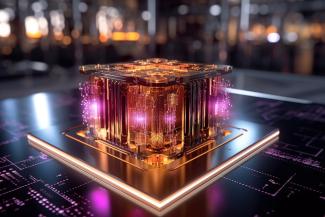NETL Research Scientist Ruishu Wright is spreading the word about the Laboratory’s growing expertise in quantum sensing — an advanced sensor technology that improves the accuracy of collecting data to assess pipeline integrity and detect gas leakage by sensing changes in motion and electric and magnetic fields on the quantum level — to national audiences.
Wright, fresh off an appearance at a U.S. Department of Transportation (DOT) Quantum Technologies in Transportation Workshop held July 10 in the Nation’s Capital, briefed participants at the U.S. Department of Energy’s Cybersecurity and Technology Innovation Conference in Dallas, Texas.
Wright’s presentations outlined for fellow researchers how NETL is working to demonstrate that the use of quantum sensing can more effectively monitor pipeline and infrastructure integrity and detect methane leaks than traditional sensor technologies.
She said using quantum sensing technologies to collect data can be more accurate, thorough and sensitive because they can provide a level of detail and precision that is impossible with traditional sensors.
She noted that there are many more mature quantum technologies that have been commercialized like atomic clocks, quantum gravimeters, and quantum magnetometers while other quantum sensor technologies are still in the research and development phase.
While quantum sensor technologies have many promising features, Wright said quantum sensor technology adoption and implementation will require additional evaluation to effectively capitalize on unique features that even advanced classical sensors can’t provide.
NETL has a long record of planning for the emergence of quantum sensing and computing in the energy research arena. In 2019, for example, NETL leaders convened the Fossil Energy Workshop on Quantum Information Science and Technology, which was the first time that experts from a range of fields met to exchange information and explore potential research opportunities for quantum computing to advance fossil energy research projects.
Specifically, NETL’s Quantum Sensing project is pursuing selected near-term research and development opportunities for quantum sensing that can impact its mission to improve the nation’s energy infrastructure.
“For example, quantum sensing and quantum-enhanced sensors could be used in subsurface monitoring, natural gas infrastructure monitoring, and rare earth element detection,” Wright said. “NETL’s Quantum Information Science & Technology initiative applies quantum approaches to energy technology development problems like subsurface engineering, sensors and detectors, power plant design, electrical grid improvements, cybersecurity, materials development, emission control system design and optimization, and power plant operation and control.”
In addition to Wright, NETL’s Quantum Sensing Team includes Yuhua Duan, Michael Buric, Hari Paudel, Jeff Wuenschell, Scott Crawford, Gary Lander, Matt Brister, Nageswara Lalam, Rick Pingree, and Hari Bhatta. The team works closely with NETL’s efforts to use quantum computing for analysis activities in energy research because quantum information science is expected to profoundly change the practice of science and engineering in the coming decades.
Quantum computing uses the principles of quantum mechanics to sift through large numbers of possibilities to extract solutions to complex problems at speeds exponentially higher than conventional computers with less energy consumption. Quantum computing is a rapidly progressing field, fueled by large investments from the private sector and government.
The DOT event where Wright spoke was part of a series established to explore the opportunities of quantum-based technologies in the transportation sector. The workshop introduced a full scope of quantum technologies and started a conversation about how the technologies can address challenges within the transportation domain. DOT officials indicated that the workshops are intended to develop a roadmap for future research and collaborations.
The full series of DOT workshops devoted to quantum technologies can be accessed here. Wright’s presentation is in the recording titled “Quantum Technologies in Transportation Workshop” and begins at 2:17:58.
Meanwhile, DOE’s Cybersecurity and Technology Innovation Conference explored the developments and challenges in cybersecurity, technology innovation, workforce development, and critical infrastructure protection. Speakers and attendees included top thought leaders from across DOE, federal agencies, academia, international partners, and private industry leaders.
NETL is a U.S. Department of Energy national laboratory that drives innovation and delivers solutions for an environmentally sustainable and prosperous energy future. By using its world-class talent and research facilities, NETL is ensuring affordable, abundant, and reliable energy that drives a robust economy and national security, while developing technologies to manage carbon across the full life cycle, enabling environmental sustainability for all Americans.





